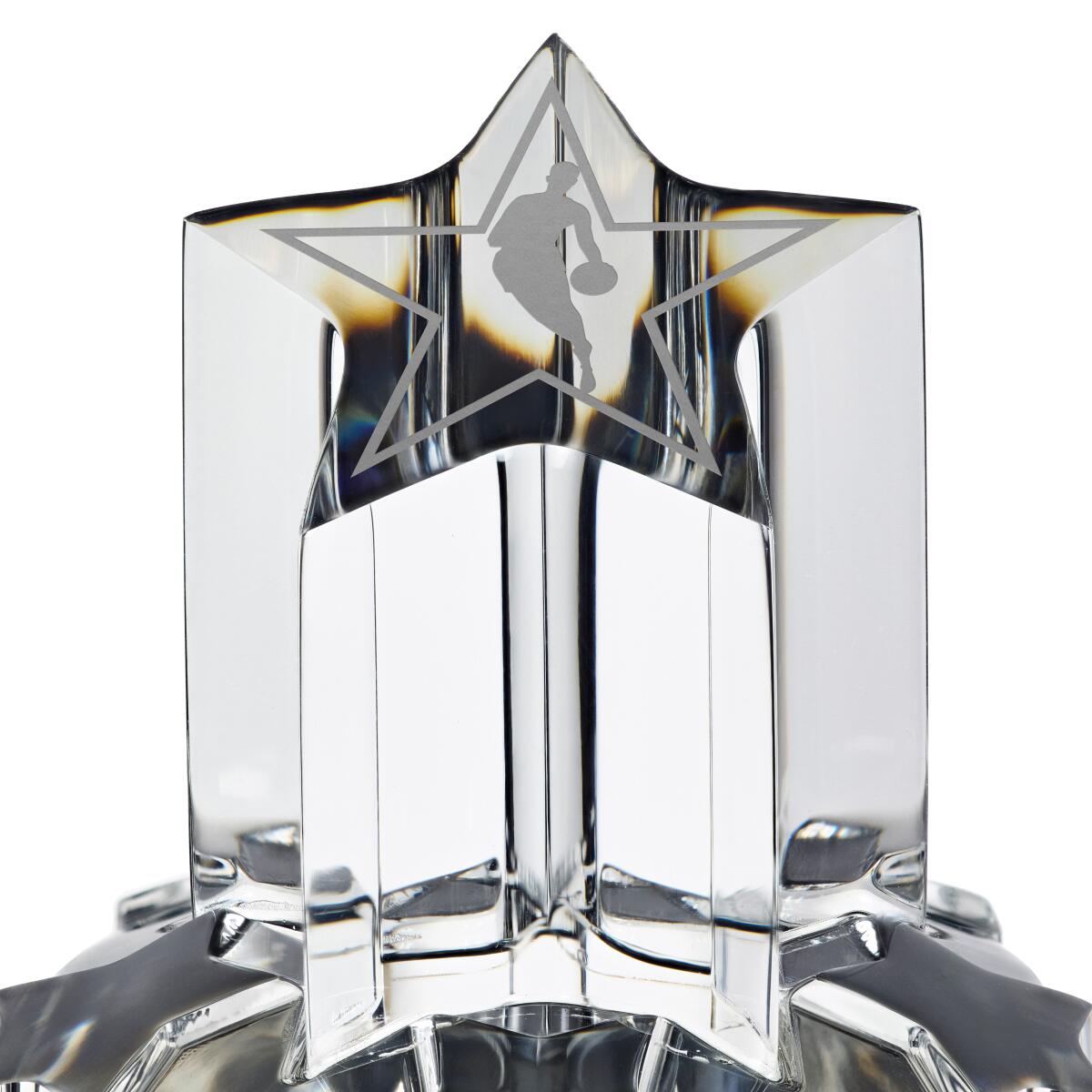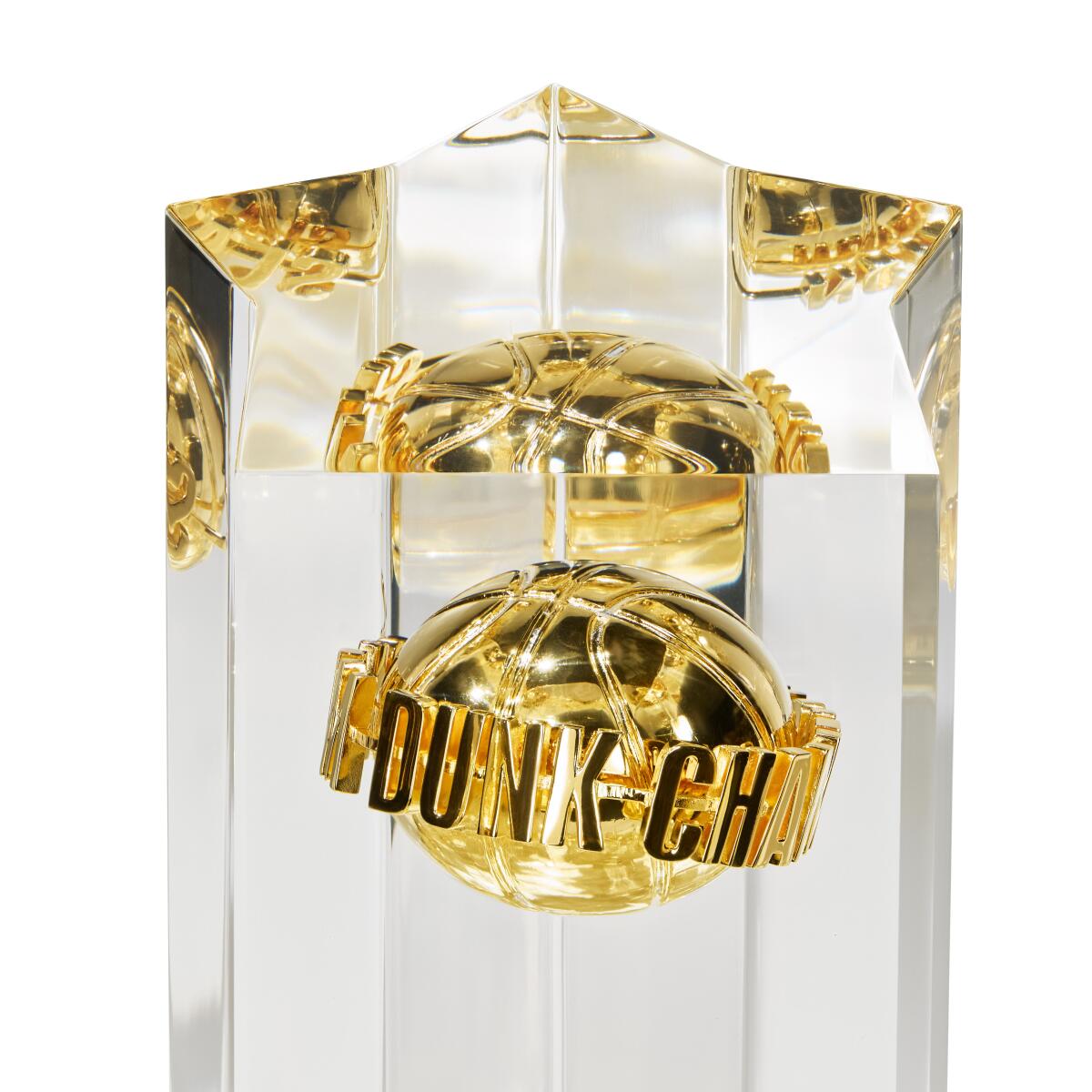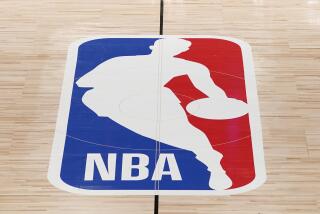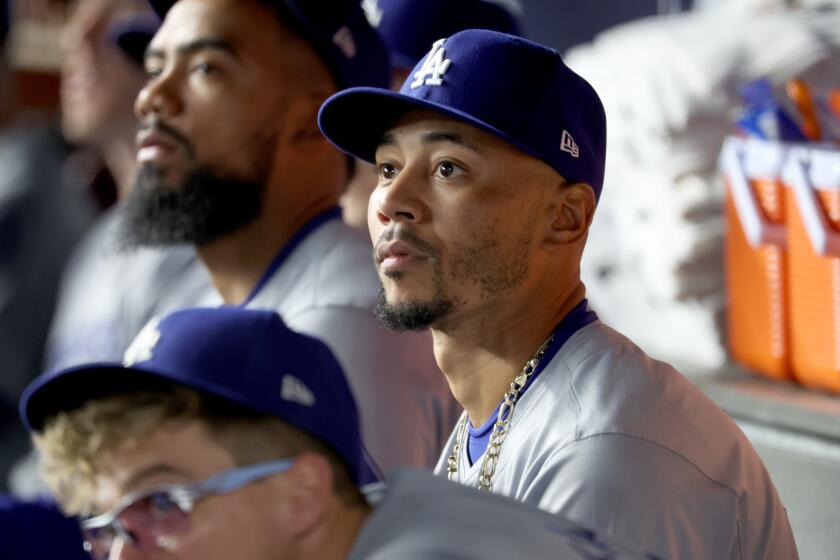How Victor Solomon helped design Kobe Bryant MVP trophy for All-Star game

Years before Victor Solomon turned to basketball as an avenue for artistic originality, he was a basketball mimic.
Raised in Boston, Solomon used to run around his school‘s playgrounds recreating Celtics star Larry Bird’s victory in the 1988 NBA All-Star three-point contest, a win Bird secured with a flurry of late shots, then coolly celebrated by lifting an index finger, all without even removing his warmup shirt.
“We were just doing that s--- all the time, heaving it from as close to three as we could and throwing the finger up to celebrate,” Solomon said. “That was a really special moment, as far as my inspiration to basketball goes.”
When the NBA convenes in Cleveland for the 2022 All-Star weekend Feb. 18-20, the champion of the three-point contest will now raise something else — a trophy designed by Solomon. It is one of several conceived by the Los Angeles-based artist, and revealed Thursday by the NBA, as part of a collaboration with the league, which wanted to freshen up its look ahead of this season’s 75th anniversary.
The champions of the slam dunk, three-point and skills events, along with the most valuable player of the Rising Stars game, will take home a 14-inch-tall, star-shaped column embedded with a 24-karat basketball orbited by the text spelling out each competition. In a practice that has continued since 1983, each All-Star will receive a ring honoring their selection, but this one is a Solomon design evoking a basketball’s seam, complete with 22 stars and 22 diamonds. Even the most valuable player of the celebrity game will receive what Christopher Arena, the NBA’s head of on-court and brand partnerships, described as a 20-pound crystal basketball with a laser-etched “MVP” suspended in its center.
Additionally, champions of the Rising Stars game will earn medals, and participants in a first-ever matchup of historically Black colleges will take home trophies fashioned from courts, which feature the words “Black Lives Matter,” played on during the league’s 2020 “bubble.”
“Is it getting people to think about trophies differently? Absolutely,” Arena said. “But I think we do that with everything we do because I do believe we’re an innovative league.”
Yet physically and metaphorically, the last trophy to be awarded on All-Star weekend might be the weightiest.
Two years after the NBA renamed its All-Star most valuable player award after the late Kobe Bryant, the new Bryant trophy is a mix of what Solomon called shape and storytelling. Each design choice is a nod toward one of Bryant’s lengthy accomplishments. Just a sample: Its eight-sided base represents Bryant’s original Lakers number — and eight decades of NBA All-Star games — and is surrounded by 18 stars, one for each of Bryant’s All-Star selections.
Atop it sits four additional levels whose dimensions and details are an homage to Bryant’s Hall of Fame achievements. Twenty-four stars encircle the first level; 10, the number Bryant wore with USA Basketball, ring the second. The five stars around the third level stand for his five NBA championships and a five-man team; the two-inch height of the final level represents Bryant’s pair of Finals MVP awards.

Solomon knows how it sounds, the Celtics fan commissioned, in part, to honor a Lakers great. But Solomon, who once met Bryant on a commercial shoot, said the guard had become a muse along a career path that has seen Solomon carve out a niche within basketball circles by reimagining the game’s everyday symbols into opulent vessels. His collection, Literally Balling, features stained-glass backboards whose net evokes the strings of a chandelier, and crystal-clear basketballs with gold-laden seams where the rubber channels would be, filled with carnations, roses and leather from official game balls.
Though Solomon has sold pieces to numerous NBA players, All-Star weekend will push his work into its most mainstream exposure yet.
“Despite my Celtics fandom, I had always respected Kobe and adopted the Lakers as my L.A. team, my new home court,” he said. “Kobe’s presence is with me, always. Every street corner has a mural. There’s always some reference to him. So as we started embarking on this one in particular, the stakes felt really high. And, you know, we were very mindful of what we could do to celebrate what was such an iconic figure, while also building some unique storytelling.
“And really, the pressure of creating a new silhouette named after someone as iconoclastic as him was really, really a fun challenge and exciting thing.”
Some of the league’s most visible symbols aren’t expected to change. Last year, following an appeal from Brooklyn guard Kyrie Irving to change the league’s logo to reflect Bryant, commissioner Adam Silver said there were no such talks ongoing within the league office. Similarly, Arena called the design of the golden Larry O’Brien Trophy given to each NBA champion essentially sacrosanct.
But one year ago, with the league office updating its brand identity for its 2K gaming league and Basketball Africa League, the concept of reimagining its All-Star trophies was first broached with Solomon, who was already working with the NBA on a revamped trophy for its developmental G league.
“I always thought that the trophy was a really interesting storytelling element, because it is the totem that represents the pinnacle of this life’s journey,” Solomon said. “And there’s this really clean beautiful meritocracy to sport that rewards that in a special way. So that object that is representative of that, the totem that these guys will carry on them for the rest of their lives to celebrate them having had that moment I felt like deserves to be elevated even further.”

After Portland’s Anfernee Simons elevated above the rim to win last season’s dunk competition, he lifted a golden basketball attached to a wooden base, a design that had changed only imperceptibly in more than 30 years since the days of duels between Michael Jordan and Dominique Wilkins.
At first glance, then, Solomon’s design is a radical departure. He and Arena said they were cognizant of the league’s history during the design process, saying the suspended 24-karat basketball in each crystal column is intended to echo past trophies.
“So we’re not just making a bunch of shiny stuff for people to show in their Instagram,” Solomon said. “What we’re doing is trying to take the entire history of everything that we’ve had up until this moment and spin it forward for the next era.”
More to Read
Go beyond the scoreboard
Get the latest on L.A.'s teams in the daily Sports Report newsletter.
You may occasionally receive promotional content from the Los Angeles Times.











